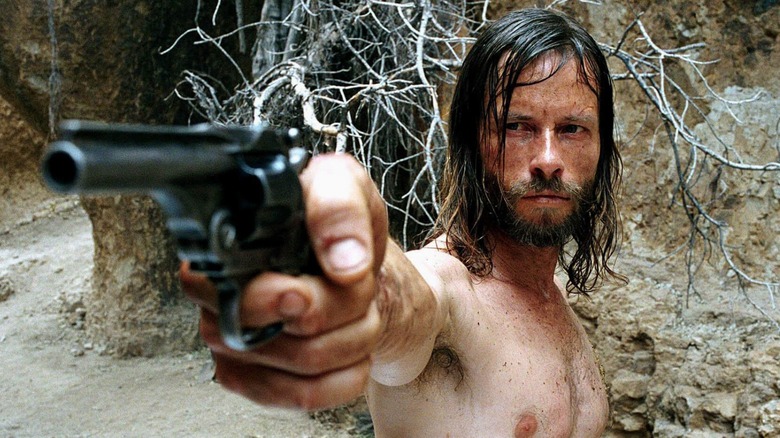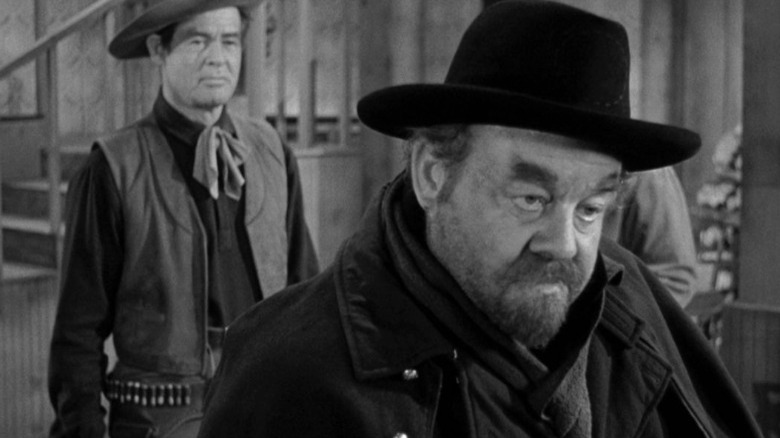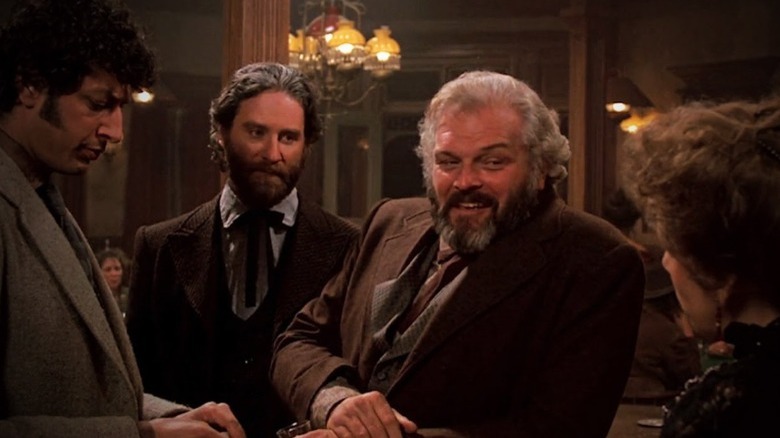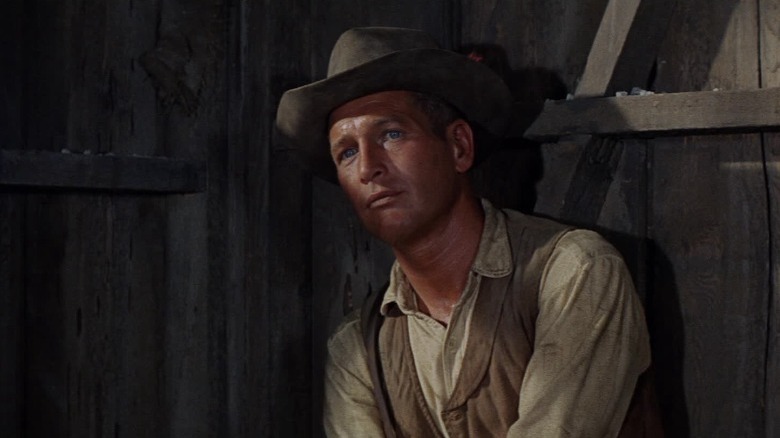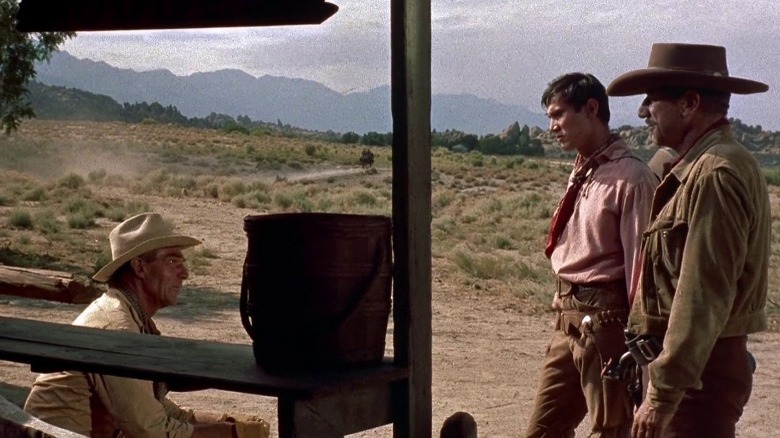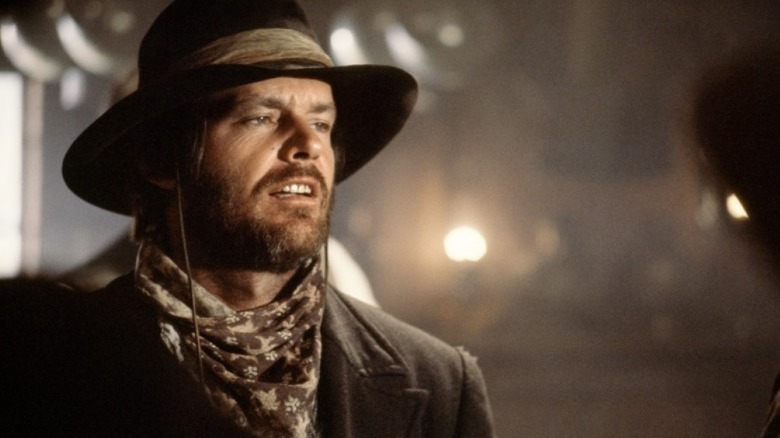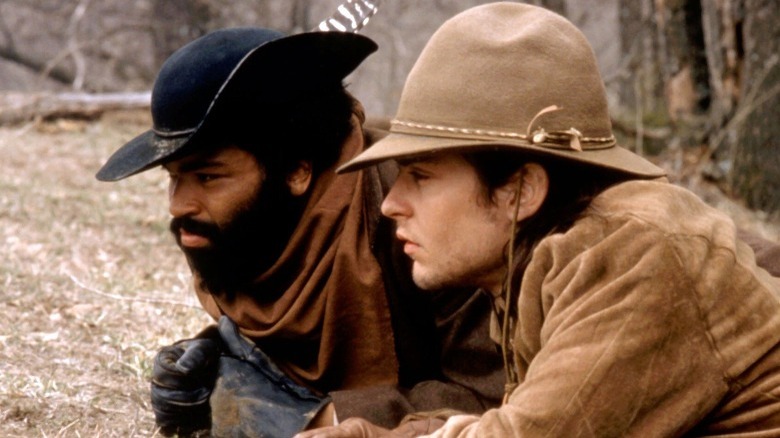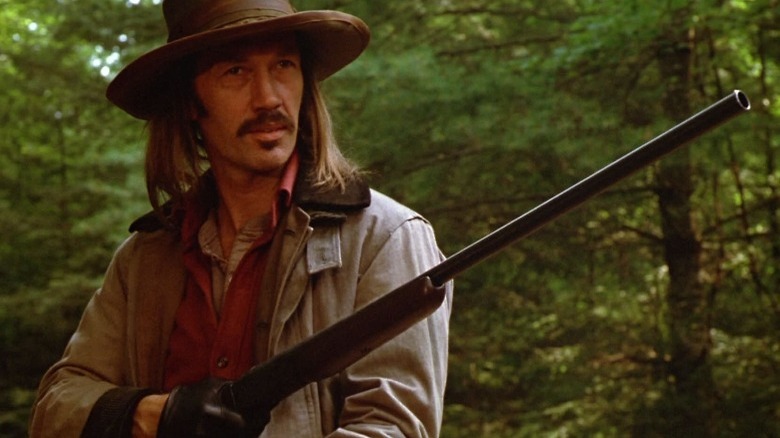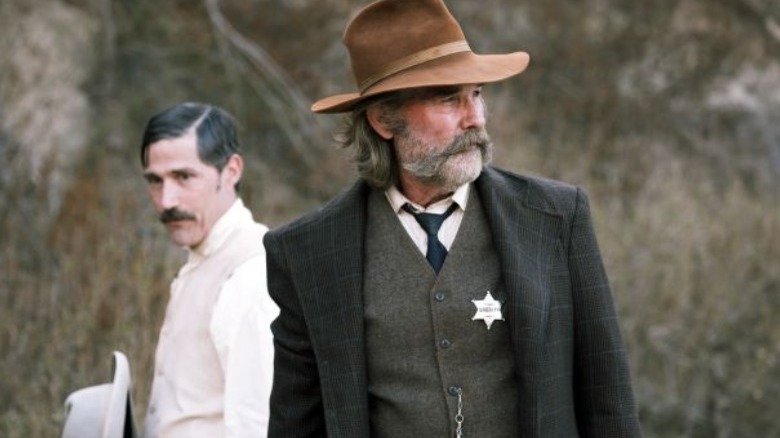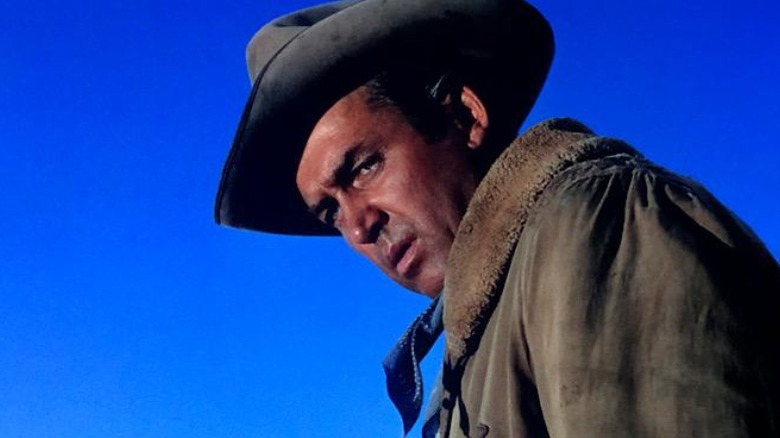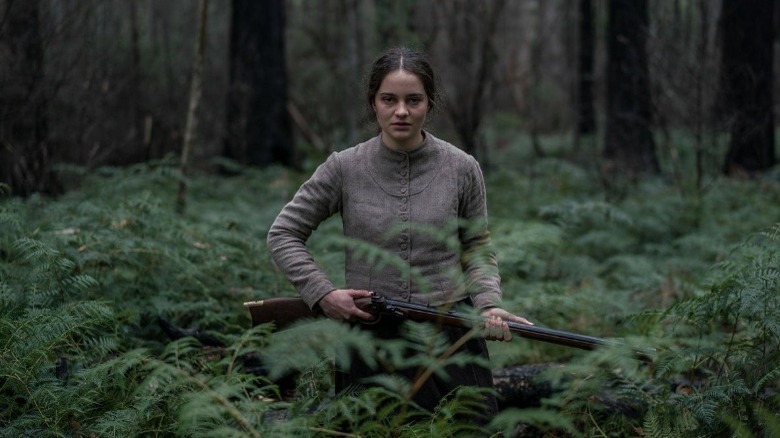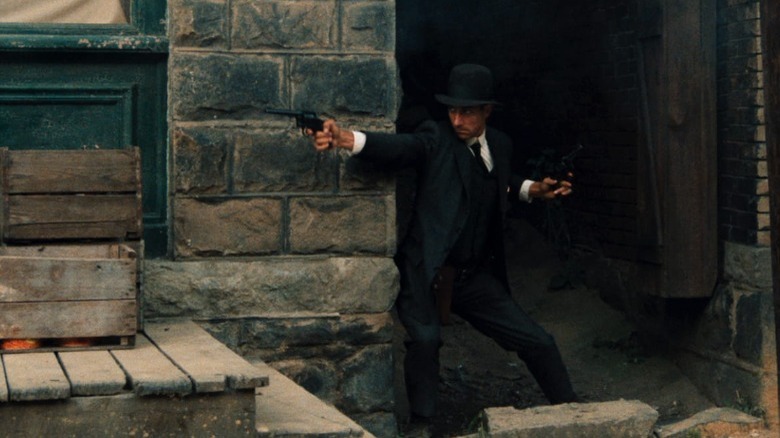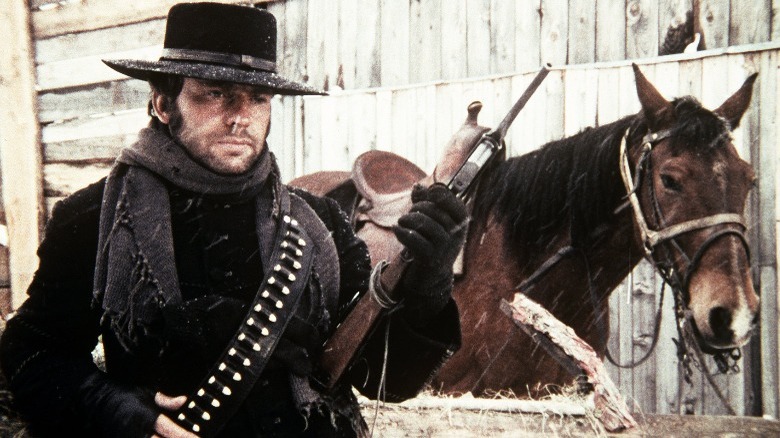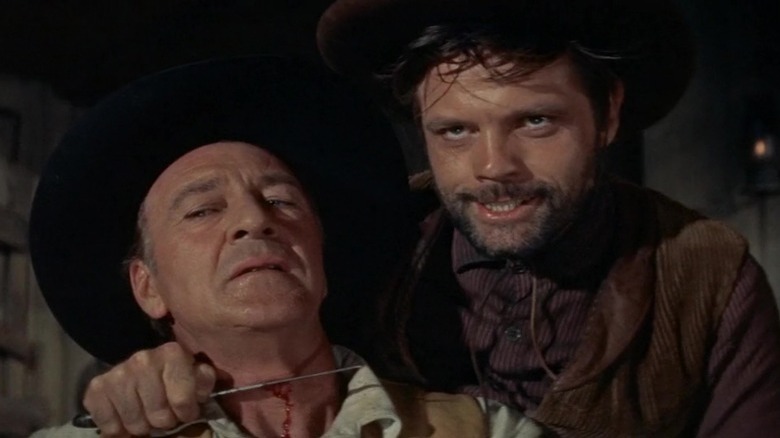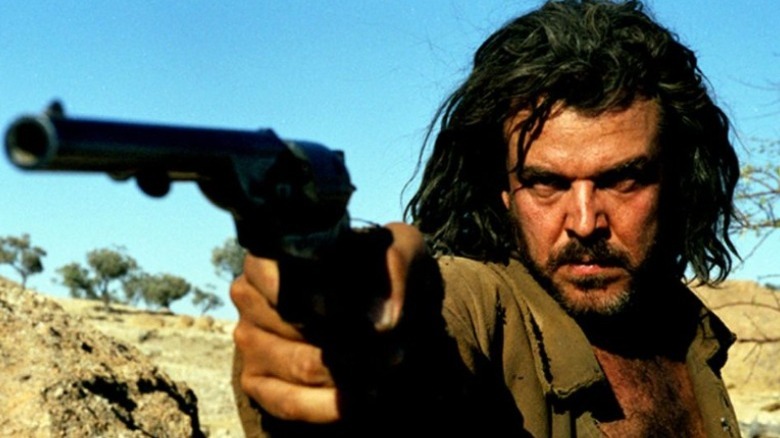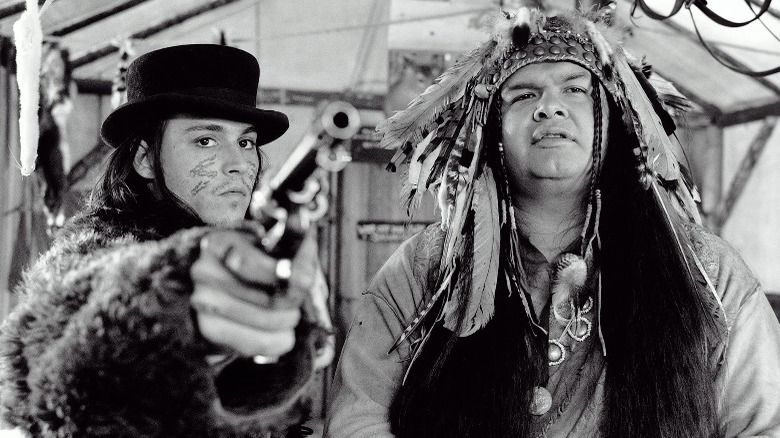15 Underrated Westerns You Need To Watch
The western is a great genre but an odd one in nature. It covers a very specific era, and is filled with easily identifiable tropes and archetypes (including a few that haven't aged particularly well), and yet there is so much variety within it. This has, in turn, led to a vast number of iconic films. In fact, there are so many great westerns that some gems are always going to be overlooked.
This is a list of the best underrated westerns that we think deserve a wider audience. This is not a list of the most underrated westerns we can think of, but rather a selection of excellent films that are rarely found on "best of all time" lists. Once you're done with the classics — "Stagecoach," "The Good, the Bad, and the Ugly," "Unforgiven," and so on — make sure you check these other fantastic westerns out at the earliest opportunity.
Day of the Outlaw
Best summed up as "High Noon" if Gary Cooper was also a baddie, this little seen classic from Andre De Toth is an efficient, moody character piece, with an excellent self-loathing performance from Robert Ryan. He plays Starrett, the iron-willed cattle baron and self-appointed leader of his community, where the homesteaders have come to detest him. But when the town is overrun by a group of deserters, led by the ailing Bruhn (Burl Ives), Starrett takes it upon himself to protect them.
Ryan was always best when playing complicated roles, and Starrett is a perfect example. He's arrogant and cold-hearted at the start, perfectly willing to gun down a farmer if it means that he can marry the man's widow. But Ryan perfectly conveys his character's inner vulnerability, and his petulance that the townsfolk don't like him. This complex characterization is what makes the story so compelling, especially as he attempts to save the town (and redeem himself) by leading the volatile gang into the snow-covered mountains for a tense climax.
Silverado
This film really deserves more love. Similar to his seminal neo-noir debut, "Body Heat," Lawrence Kasdan incorporates every genre trope he can into "Silverado." And yet, it's a film that seems to have been universally forgotten, which is a shame because it might be the most fun western ever made, with a rousing score and a pitch-perfect cast that includes Scott Glenn, Kevin Kline, Danny Glover, and Kevin Costner.
The dialogue is as playful as you would expect from Kasdan, and there are some laugh-out-loud moments mixed with set pieces that are as memorable as any from the classic western era. The romance plot might be a damp squib, but the real heart of the film is the platonic relationship between saloon owner Stella (Linda Hunt) and adventurer Paden (Kline). Brian Dennehy plays the villainous, constantly grinning sheriff, one of the greatest Western villains of all time, and certainly Dennehy's best film role. Dennehy brings so much charisma to the part that it's impossible to hate him, especially when he delivers lines like "I'm running out of deputies" as his henchmen are continually killed by our heroes.
Hombre
Elmore Leonard wrote his fair share of westerns, but none resonate today in quite the same way as "Hombre." In the film, Paul Newman plays John Russell, a man raised by the Apache who has to travel to the nearest city by stagecoach. The other passengers are shocked when they find out about his heritage, and demand he sit outside with the Mexican driver (Martin Balsam). However, when the coach is held up and they are abandoned in the desert, the passengers turn to Russell to save them.
Newman is effortlessly cool here, and never softens his character to make him more likable. He is a blunt, unsentimental man who sees through the hypocrisy of the pious Doctor Favor (Fredric March) immediately, calling him out on his "charitable" nature. Favor remains the most despicable character, and that's really saying something considering the caliber of the villains on display.
Richard Boone makes an imposing, charismatic baddie, and has strong support from Cameron Mitchell, David Canary, and Frank Silvera as his henchmen. Leonard's dialogue is quick-witted as ever — after Boone walks up a steep hill to deliver a threatening ultimatum to the survivors, Russell pipes up with, "Hey, I got a question. How do you plan on getting down that hill?" before mercilessly opening fire. So cool.
The Tall T
Certainly overdue for a re-evaluation, Budd Boetticher's westerns, particularly the ones he made with Randolph Scott, are B-movie masterpieces. "Comanche Station" and "Ride Lonesome" are both worth a look, but "The Tall T" is the best, and a perfect introduction to his style. Scott plays an aging cowboy caught up in a hostage situation when his stagecoach is hijacked by a trio of desperate outlaws played by Richard Boone, Henry Silva, and Skip Homeier, who take the passengers hostage in the hope of ransoming the newly married heiress (Maureen O'Sullivan) to her wealthy father.
What makes this film so interesting is the relative lack of violence for most of the runtime. Instead, Boetticher examines the blurred lines between good and evil, with supposedly heroic characters shown to be just as venal as the villains, and Boone's Frank Usher emerging as an almost noble character with his own moral code. Weary of his criminal lifestyle, he identifies with Scott more than his sadistic henchmen. When the violence does arrive, though, it's shocking in its casual brutality.
Boetticher's films with Scott all propagate the mythic nature of the old west, and "The Tall T" is a perfect example. The dialogue is so pulpy that it would be risible if it wasn't delivered with wonderful conviction by Scott — "There are some things a man can't ride around".
The Missouri Breaks
Arthur Penn's offbeat western is a hidden gem, with both stars playing outside their comfort zone to great effect. Jack Nicholson has never been more understated as the cattle rustler Tom Logan, while Marlon Brando is flamboyant as Robert Lee Clayton, the "regulator" hired to kill Logan and his gang, which is made up of some of the best actors from the '70s, including Fredric Forrest, Randy Quaid, and Harry Dean Stanton (in one of his most memorable and poignant supporting roles). Clayton is a terrifying figure — even when serenading his horse, there's something chilling about him, and the way he toys with his unassuming victims before killing them.
Penn takes pleasure in undermining the mythos of the traditional western. Logan is an old-fashioned western archetype, more honorable than the lawman on his trail. He criticizes Clayton for shooting his quarry from a distance, never having to look them in the eye, but Clayton takes pride in this (reflected later in the film, when he kills Logan's men when they are at their most vulnerable). Logan even refuses to kill Clayton when he turns his back on him. By the end, though, Logan descends to Clayton's level in a final showdown that is simultaneously audacious, anticlimactic, and entirely appropriate.
Ride with the Devil
Ang Lee's Civil War epic is often forgotten among his more mainstream movies, but it might be his best film. The war is shown through the eyes of a handful of characters, principally Tobey Maguire's German-born Roedel, who joins the Bushwhackers, guerrilla soldiers on the side of the Confederacy. Maguire has never delivered a more mature performance, and his character almost imperceptibly changes over the course of the film. Lee really nails the way neighbors were turned against one another and treats both sides with an even hand. When Maguire bumps into old acquaintance Mark Ruffalo on the opposing army, there's a sense of awkwardness. It's an uncomfortable encounter for both men that inevitably ends in tragedy.
All of the characters are nuanced and interesting, especially Jeffrey Wright as the freed slave fighting for the Confederates, and Jonathan Rhys Meyers as a truly loathsome villain. It has a real sense of authenticity, and Lee directs the frenetic battle scenes with a sure hand. An excellent western and an equally excellent war film, "Ride with the Devil" is underrated on both counts.
The Long Riders
You could make the argument that all of Walter Hill's films are westerns (he certainly would) but he only ventured overtly into the genre a handful of times, to varying degrees of success. There's little doubt, though, that "The Long Riders" is the most successful of these efforts.
The film is best remembered for the casting of real-life brothers as related gang members — James and Stacy Keach play the James brothers, David, Keith, and Robert Carradine appear as the Youngers, Randy and Dennis Quaid take on the Millers, and Nicholas and Christopher Guest play the opportunistic Ford brothers. It's a proper family affair that informs the dynamic of the group. There's something about Randy Quaid turning his back on his real brother that just carries more weight. Towards the end the casting bears even more significance, as family loyalties lead to fractures among the gang.
Hill gets the era perfectly right, with the shadow of the Civil War still looming large over the characters, and the climactic shootout is the most visually impressive since "The Wild Bunch," with disorienting, slow-motion action, and the impact of each bullet reverberating on the soundtrack.
Bone Tomahawk
Part western, part horror, S. Craig Zahler's assured debut has a lot more substance than the infamously grisly sequences it's now best known for. Zahler creates a world that feels lived in, with authentic dialogue that's witty without drawing attention to itself. The entire middle section could have been lifted from a traditional western, with the four heroes bickering and squabbling as they track the nightmarish "troglodytes" across all manner of barren landscapes. The characters are all developed and shown to be likeable, decent men, which only makes the horror elements all the more disturbing when they appear.
In his second western of 2015 (he also appeared in "The Hateful Eight"), Kurt Russell finds his niche as an irascible sheriff, barking lines like "Why are you in my breakfast?" like a seasoned pro. However, it's Matthew Fox who steals the film as the cocky Brooder, a callous dandy who is nonetheless revealed to be a more nuanced character than he first appears.
Shot in only 21 days, Bone Tomahawk is an impressive genre piece, with economical storytelling and some truly horrifying moments that sear themselves into your memory. Surrounding those moments though, is a well-observed, classic story with well-rounded performances from an excellent cast.
The Naked Spur
Anthony Mann made several celebrated westerns with James Stewart, but "The Naked Spur" is one that isn't talked about enough. It's a film with a minimal cast, but tells its story on an epic scale, with some beautiful, expansive locations. Kemp (Stewart) is hunting murderous outlaw Ben Vandergroat (Robert Ryan) and is aided by grizzled prospector Tate (Millard Mitchell) and disgraced cavalryman Anderson (Ralph Meeker). However, once they capture the fugitive and his accomplice (Janet Leigh), he reveals that Kemp isn't a lawman but a bounty hunter, entitling the others to a share of the reward.
So begins a morality tale of mistrust and avarice, as the characters squabble about their shares, and Vandergroat plants the seeds of betrayal in their minds. With only five named characters in the entire film, it's a proper character piece, and the way each of their backgrounds and personality flaws are revealed over the course of the film is masterfully done. The broody, vengeance-driven hero is one of Stewart's darkest roles, and Ryan is exceptional as the amiably malevolent killer who pits the others against each other, whispering in their ears and fueling their paranoia.
The Nightingale
Jennifer Kent's follow up to "The Babadook" flew largely under the radar but remains an incredibly powerful piece of cinema. Aisling Franciosi gives a breathtaking performance as a former prisoner who is abused by her captor and suffers a devastating loss, setting her on a course of vengeance, guided reluctantly by Billy (Baykali Ganambarr), an Aborigine tracker.
It's a bleak, controversial film (several critics walked out when the film was shown at Cannes), and Kent never flinches in her depiction of the horror that she puts her characters through. But while the violence is sudden and shocking, it's never gratuitous. In fact, it's necessary. This isn't a story about a "badass" woman getting her own back, it's about a woman who is broken reclaiming her humanity. Billy himself is so accustomed to the unforgiving environment, and the endemic racism, that he's utterly desensitized to it all, but breaks down when he's shown the tiniest amount of kindness.
What really makes "The Nightingale" work though, is the relationship between the two leads. The grudging respect that grows between them, which gradually evolves into affection, makes it an incredibly beautiful, brutal film.
Matewan
John Sayles' socialist drama barely qualifies as a western, focusing more on the infamous miners' strike of the title than any genre tropes. It even sits in an awkward place historically — it's filled with motorcars and machine guns, which don't usually crop up in movies like these. However, Haskell Wexler's beautiful cinematography, and the central conflict, is evocative of classic westerns.
In his film debut, Chris Cooper plays the idealistic union man who arrives in the town of Matewan to unite the disparate groups of miners being exploited by the coal company. As hired guns coerce and intimidate the workers and begin evicting anyone who stands up to them, the tension builds to an unavoidable confrontation.
The climactic shootout is breathtaking, as the townspeople leap into action. David Strathairn has never been cooler than he is as the blunt, taciturn sheriff who proves his mettle during the gunfight. Kevin Tighe is deeply unpleasant as the grinning heavy, and Bob Gunton plays a character even more loathsome than his warden from "The Shawshank Redemption." A significant and increasingly relevant film, "Matewan" remains criminally overlooked.
The Great Silence
Another favorite among cinephiles (and a clear influence on "The Hateful Eight"), Sergio Corbucci's "The Great Silence" is arguably the greatest spaghetti western not directed by Sergio Leone.
Beautifully shot in the snow with a sorrowful, elegiac score by Ennio Morricone, the film follows Silence (Jean Louis Trintignant), a mute gunslinger with a Mauser pistol who only kills in self-defense. For once, the bounty hunters are the villains, as Tigrero (Klaus Kinski) gleefully kills unarmed fugitives, secure in the knowledge that the law is on his side. With the outlaw villagers chased into the hills, the bounty hunters kill them one by one, until the arrival of Silence stirs up trouble.
Trintignant makes Silence a melancholy, compelling character, and Kinski is a pragmatic, deliciously evil villain — the scenes between the two are packed with tension, and they play off each other brilliantly. There are plenty of spaghetti westerns worthy of a place on this list ("The Big Gundown," "Face to Face," "Death Rides a Horse") but none of them are as unique as this one; it also features what might be the most pessimistic ending in all of cinema.
Man of the West
A favourite of Jean Luc Godard, who called it "an admirable lesson in cinema – in modern cinema," Anthony Mann's masterpiece should be as highly regarded as "Stagecoach" or "The Searchers," but is in reality rarely discussed, maybe because at its core it's a much darker film than it initially appears.
Link Jones (Gary Cooper) is the reformed outlaw on his way to hire a schoolteacher when the train he's traveling on is robbed, and he and a couple of other passengers are left to fend for themselves. As they walk to the next town, they find the train robbers hiding out (Jack Lord, John Dehner, Robert J. Wilke, and Royal Dano form just about the best gang of villains of any classic western), and Link's murky past catches up with him.
Beginning conventionally enough, the tone changes subtly over the course of the film, starting the shocking moment the comic relief character is ruthlessly killed off. From then on, there's a palpable sense of dread that builds until the final inevitable showdown, as Link is torn between his criminal past and the peace he has found in his new life. Casting Cooper as the protagonist is both questionable and pretty astute. He's clearly too old for the role — he's nearly 10 years older than Lee J. Cobb, who plays his uncle — however, it also seems apt that such an icon of the genre would play the lead in a film that feels so final.
The Proposition
15 years later, John Hillcoat still hasn't bettered this brutal Australian western. Charlie Burns (Guy Pearce) and his younger brother Mikey (Richard Wilson) are captured by British Captain Stanley (Ray Winstone) when he is presented with a choice. He can find and kill his older brother Arthur (Danny Huston), or Mikey will be hanged.
Pearce is full of pathos as the conflicted outlaw, but even more impressive is Winstone as the decent captain who is hampered by disloyal subordinates and sneering bureaucrats. His relationship with his wife (Emily Watson) is incredibly tender, contrasting with the harsh violence of the Burns gang. Arthur Burns is a brilliant creation, vividly brought to life by Huston. He's well-versed in poetry and philosophy, and yet utterly insane. When one of his henchmen asks if they're misanthropes, he warmly replies, "Good lord no, we're a family" before viciously attacking a homestead.
Incredibly nasty in places and yet poetic in its use of dialogue, "The Proposition" remains one of the most lyrical westerns ever made, with a hypnotic soundtrack by Nick Cave, and some beautifully sparse cinematography. Australia has never seemed more desolate or empty.
Dead Man
One of Jim Jarmusch's most linear films, "Dead Man" is still full of his offbeat style. For once Johnny Depp plays it straight as Bill Blake, an accountant on his way to start his new job in the town of Machine. However, upon arrival, he finds there is no job, and after a confrontation that ends with him killing the son of Robert Mitchum's town boss, he ends up on the run from the law and bounty hunters alike, with only a Native American called Nobody (Gary Farmer) for company.
Depp's bewildered performance allows the supporting cast to shine, from Lance Henriksen's cannibalistic bounty hunter to Crispin Glover's decidedly odd train fireman. Meanwhile, Farmer is endlessly likable as the poetry-loving Nobody, and it's refreshing to see a depiction of a Native American character largely free of the stereotypes that pervade the genre. His performance is incredibly touching, as he constantly protects Blake, believing him to be the reincarnation of the classic poet William Blake (there are several nods to his work peppered throughout the film).
Blackly funny even if it's not an overt comedy, "Dead Man" is just as potent a deconstruction of the old west as any poe-faced revisionist western, punctuated by scenes of extreme violence and evocative symbolism. Neil Young's industrial soundtrack is incredible and washes over the film almost as much as Robby Muller's inky black and white cinematography.
